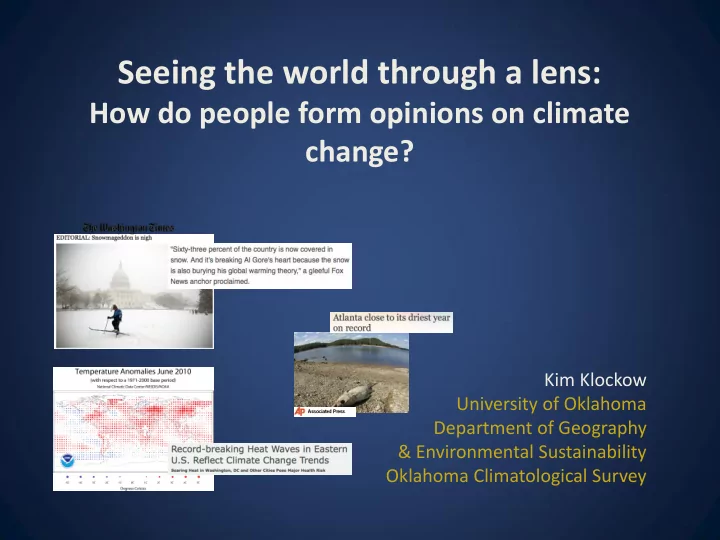

Seeing the world through a lens: How do people form opinions on climate change? Kim Klockow University of Oklahoma Department of Geography & Environmental Sustainability Oklahoma Climatological Survey
Funding provided by Sandia Labs Dr. Hank Jenkins-Smith University of Oklahoma Department of Political Science Dr. Kevin Goebbert Valparaiso University Department of Geography and Meteorology Matt Nowlin University of Oklahoma Department of Political Science
Research Introduction • Key Question: What drives individual beliefs about anthropogenic climate change ? • A few propositions: – They use weather changes as evidence (a different attribution problem -> attributing weather events to climate change) – They use socio-political cues (e.g., partisanship, ideology) – They are guided by cultural values
Cultural Cognition – A Conception of CTR • Four mechanisms, from social/cognitive psychology: – Identity-protective cognition • Hard for anyone to see anything wrong with whatever they identify with most; desire to live in social harmony – Biased assimilation and group polarization • Give credit to information that reinforces a priori beliefs – Cultural credibility heuristic • People don’t fully “understand” risks, they use perceived experts who share their values as proxies – Cultural-identity affirmation • People dismiss information that is discordant with their values
Cultural Theory of Risk Cultural cognition framework (Kahan 2010)
Survey Data Questions cover several areas of risk concern, including nuclear, pollution, and climate hazard. – Responses geocoded • Zip & Fips – Three years of data (2007 - 2012) • Total ~7500 participants – Surveys taken largely in May – Multimodal – internet and telephone data collection
Select questions from the survey • Egalitarian: What society needs is a fairness revolution to make the distribution of goods more equal. • Hierarch: Society would be much better off if we imposed strict and swift punishment on those who break the rules. • Individualist: Even the disadvantaged should have to make their own way in the world.
Meteorological Data • NCEP NCAR Reanalysis 2.5 degree grid spacing (Kalnay et al. 1996) • Match zip/fip to nearest grid point as representative region • Daily avg 2m temperature • Deviation schemes used to match perceptions – (Prior week avg - 3 yr avg) – (Prior year avg - 3 yr avg)
Select questions from the survey • Weather perception: – Temperature: In your personal experience, over the past few years have average temperatures where you live been rising, falling, or staying about the same as previous years? – Drought: In your personal experience, over the past few years has drought where you live been more frequent, less frequent, or stayed about the same as previous years? – Floods: In your personal experience, over the past few years has flooding where you live been more frequent, less frequent, or stayed about the same as previous years?
Select questions from the survey • CC beliefs: In your view, are greenhouse gases, such as those resulting from the combustion of coal, oil, natural gas, and other materials causing average global temperatures to rise? • Environmental risk: On the scale from zero to ten, where zero means no risk and ten means extreme risk, how much risk do you think global warming poses for people and the environment?
Predicted Probability of Perceiving Local Temperatures as Increasing by Affinity to Cultural Type
Predicted Probability of Perceiving Local Temperature, Drought and Floods as Increasing by Departures from Long-Term Averages
Weather conflation with climate
Factors predicting belief in anthropogenic cause of climate change Variable Estimated coefficient Significance level (Intercept) 2.597 *** Temperature Perception 2.154 *** Week-3yr T -0.012 Yr-3yr T 0.058 Gender 0.096 Age 0.002 Education 0.153 * Income 0.001 Democrat 0.8936331 *** Ideology -0.8510312 *** Egalitarianism 0.2522954 *** Multiple R-squared: 0.225, Adjusted R-squared: 0.2232 F-statistic: 125.6 on 10 and 4324 DF, p-value: < 2.2e-16 0.001 '**' 0.01 '*' 0.05 '.’ 0.1 ' ' 1 Significance codes: 0 '***'
From Dan Kahan
From Dan Kahan
Take-home messages • Perceptions of weather are important to climate change beliefs, attenuated by lenses of culture and ideology • Weather communication landscape is complex, potentially politicized, and important • Role for multiple policies in climate change discussion
Thank you! Questions? Contact information: Dr. Hank Jenkins-Smith hjsmith@ou.edu Kim Klockow kklockow@ou.edu
Recommend
More recommend